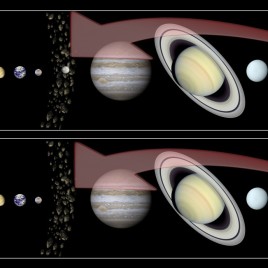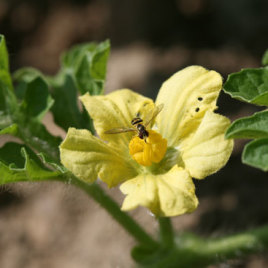Humans create small molecules inside the GI tract to help regulate the composition of gut microbes and to protect against intestinal diseases. The researchers believe the findings of the study reveal a host defense mechanism and show that microRNAs can be used to regulate the microbiome of individuals. The researchers found microRNAs produced by intestinal cells in both mice and humans regulate the activity […]
Clean energy costs could price out the poorest
Reaching strict climate goals could mean that a sizeable number of people will remain dependent on traditional stoves, despite the negative health impacts. Researchers examined the relationship between climate mitigation policies and clean energy costs in South Asia. They found the most stringent mitigation policies could increase the cost of clean fuel by 38 per cent, leaving as many as 433 million South Asians […]

Marine protected areas failing to protect history
Marine protected areas (MPAs) are failing to protect the evolutionary diversity of fish and corals, according to a new study. The researchers conclude that over 7,000 million years of the evolutionary history of corals and 3,586 million years of fish evolution is not protected. Researchers studied 450 species of fish, which represent important components of marine biodiversity, and hundreds of species of coral, and calculated how […]
Cloudy skies are enhancing ice sheet melt
Cloudy night skies are enhancing the ice sheet melt in Greenland by more than 30 per cent each year, according to a new study. Researchers believe this shows the need for including accurate cloud representations in climate modelling. The research team examined the effects of different types of clouds, such as “ice-only” or “liquid-bearing”. They […]
Icebergs leave trail of carbon-trapping plankton in their wake
Melting water from giant icebergs travelling across the Southern Ocean supports the growth of phytoplankton, which is responsible for as much as 20 per cent of the carbon trapped in the depths of the ocean. These icebergs enhance phytoplankton productivity for hundreds of kilometers, and their effects persist for at least one month after the iceberg […]

Bright spots on Ceres suggest water on the dwarf planet
Bright spots on the surface of Ceres suggest there is water activity in the main asteroid belt, and that asteroids may be more active than previously thought. Researchers analyzed data obtained from the Dawn spacecraft to make detailed observations of Ceres surface. The researchers detected 130 bright spots, which they believe contain haze, showing the involvement […]

Is Ceres from the outer Solar System?
The dwarf planet Ceres may have formed from minerals found in the outer Solar System, according to data taken by the Dawn Spacecraft. Researchers identified specific minerals, which are widespread on the planet’s surface. The minerals suggest ammonia was incorporated into the planet during its formation. Original research paper published in Nature on December 9, 2015. Names […]
How Ebola spread during the 2014-2015 epidemic
Using genome sequencing researchers have mapped how the Ebola virus spread in Western Africa during 2014 – 2015. They found Ebola entered the country several times during the early outbreak, however most of the infections were due to a single introduction of the virus, which spread rapidly. Researchers performed the sequencing in Liberia to trace the […]
Cheetahs’ genome give glimpse into their history, adaptation and survival
Genetic analysis has uncovered new details about the history, adaptation and survival of the world’s fastest land animal, the cheetah. The cheetah is descended from a relative of the American puma, and 100,000 years ago could be found across the Americas before moving into Asia and Europe. The results of the genomic analysis have pinpointed […]
E-cigarette flavourings linked to respiratory disease
Tests of 51 flavours of e-cigarettes have found 47 have chemicals which have been linked to respiratory disease. Those tested included flavours such as Cupcake and Cotton Candy, which are targeted towards younger consumers. Diacetyl, which is considered a respiratory hazard by the Flavor and Extract Manufacturers Association of the USA, was found in more […]
Dear, Health Minister – some friendly advice
The editors of the Canadian Medical Association Journal published a letter to Canada’s new Minister of Health, Dr. Jane Philpott. They called on Dr. Phillpott to let science and evidence guide policy. The authors also asked the new minister to follow through on her promises to expand home care, improve vaccination rates, and address mental […]
DNA stutters provide a hidden layer of information
Repetitive pieces of DNA, previously thought to be “junk”, play an important role in regulating how genes are expressed, according to a recent study. Short Tandem Repeats (STRs), are sections of DNA which are repeated, similar to a stutter. Researchers found STRs are able to fine tune the expression of nearby genes, and that different […]
Budgeting for climate change – A series from Nature
This week a group of articles were published in Nature Geoscience and Nature Climate change jointly focused on “budgeting for climate change”. In one article, researchers, argue against the two degree target limit for global temperature rise. Another paper suggests we should aim to aggressively reduce our current emissions, as soon as possible, saying this […]
What’s hiding around the corner? This camera knows
Seeing around corners may not be possible for the human eye, but for this camera it’s a breeze. Researchers have developed a camera system that, within three seconds, can locate an object, hidden behind a wall, and track its movement. The system fires a stream of short pulses of light onto the floor just in […]

Don’t forget the other pollinators
Butterflies, wasps, beetles and flies might not be as effective pollinators as bees but new research shows their impact shouldn’t be discounted. Non-bee pollinators visit more flowers than bees so that even if they’re not such effective pollinators, their rates pollination are similar to bees. The analysis of 39 field studies revealed there is […]
Language changes brain patterns
Very early language experience will influence how a child’s brain processes a new language later in life, according to a study in Nature. Researchers examined three groups of children, all of whom were fluent in French. One group had no exposure to Mandarin, another was fluent in Mandarin, and the last third group had been […]